初中英语同义词辨析
初中英语同义词辨析知识点梳理
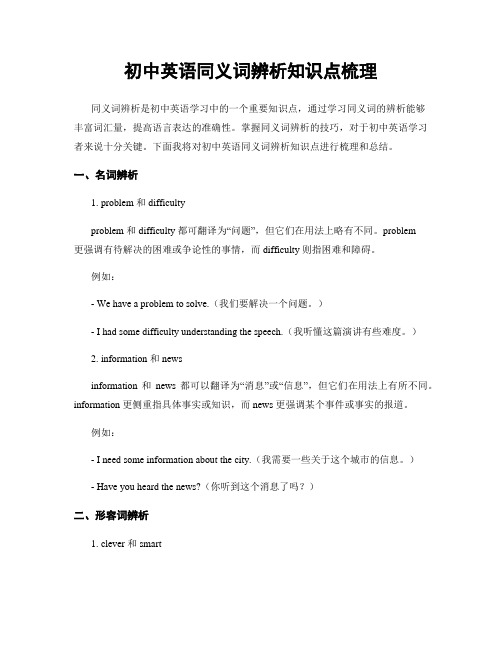
初中英语同义词辨析知识点梳理同义词辨析是初中英语学习中的一个重要知识点,通过学习同义词的辨析能够丰富词汇量,提高语言表达的准确性。
掌握同义词辨析的技巧,对于初中英语学习者来说十分关键。
下面我将对初中英语同义词辨析知识点进行梳理和总结。
一、名词辨析1. problem 和 difficultyproblem 和 difficulty 都可翻译为“问题”,但它们在用法上略有不同。
problem更强调有待解决的困难或争论性的事情,而 difficulty 则指困难和障碍。
例如:- We have a problem to solve.(我们要解决一个问题。
)- I had some difficulty understanding the speech.(我听懂这篇演讲有些难度。
)2. information 和 newsinformation 和news 都可以翻译为“消息”或“信息”,但它们在用法上有所不同。
information 更侧重指具体事实或知识,而 news 更强调某个事件或事实的报道。
例如:- I need some information about the city.(我需要一些关于这个城市的信息。
)- Have you heard the news?(你听到这个消息了吗?)二、形容词辨析1. clever 和 smartclever 和smart 都可以翻译为“聪明”的意思,但它们在用法和意义上有所差别。
clever 强调智力明晰,能够快速理解和解决问题,而 smart 则更侧重于外表和衣着得体。
例如:- He is a clever student who always gets good grades.(他是个聪明的学生,总是取得好成绩。
)- The boy looks smart in his new suit.(这个男孩穿上新衣服看起来很帅气。
)2. interesting 和 excitinginteresting 和 exciting 都可以翻译为“有趣”的意思,但它们在用法上有所区别。
初一英语常用同义词辨析
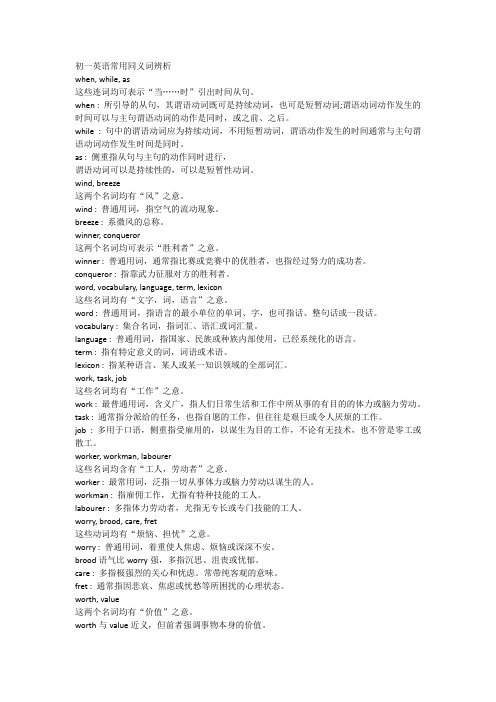
初一英语常用同义词辨析when, while, as这些连词均可表示“当……时”引出时间从句。
when : 所引导的从句,其谓语动词既可是持续动词,也可是短暂动词;谓语动词动作发生的时间可以与主句谓语动词的动作是同时,或之前、之后。
while : 句中的谓语动词应为持续动词,不用短暂动词,谓语动作发生的时间通常与主句谓语动词动作发生时间是同时。
as : 侧重指从句与主句的动作同时进行,谓语动词可以是持续性的,可以是短暂性动词。
wind, breeze这两个名词均有“风”之意。
wind : 普通用词,指空气的流动现象。
breeze : 系微风的总称。
winner, conqueror这两个名词均可表示“胜利者”之意。
winner : 普通用词,通常指比赛或竞赛中的优胜者,也指经过努力的成功者。
conqueror : 指靠武力征服对方的胜利者。
word, vocabulary, language, term, lexicon这些名词均有“文字,词,语言”之意。
word : 普通用词,指语言的最小单位的单词、字,也可指话、整句话或一段话。
vocabulary : 集合名词,指词汇、语汇或词汇量。
language : 普通用词,指国家、民族或种族内部使用,已经系统化的语言。
term : 指有特定意义的词,词语或术语。
lexicon : 指某种语言、某人或某一知识领域的全部词汇。
work, task, job这些名词均有“工作”之意。
work : 最普通用词,含义广,指人们日常生活和工作中所从事的有目的的体力或脑力劳动。
task : 通常指分派给的任务,也指自愿的工作,但往往是艰巨或令人厌烦的工作。
job : 多用于口语,侧重指受雇用的,以谋生为目的工作,不论有无技术,也不管是零工或散工。
worker, workman, labourer这些名词均含有“工人,劳动者”之意。
worker : 最常用词,泛指一切从事体力或脑力劳动以谋生的人。
初中英语 常用同义词辨析 English Synonyms O 素材
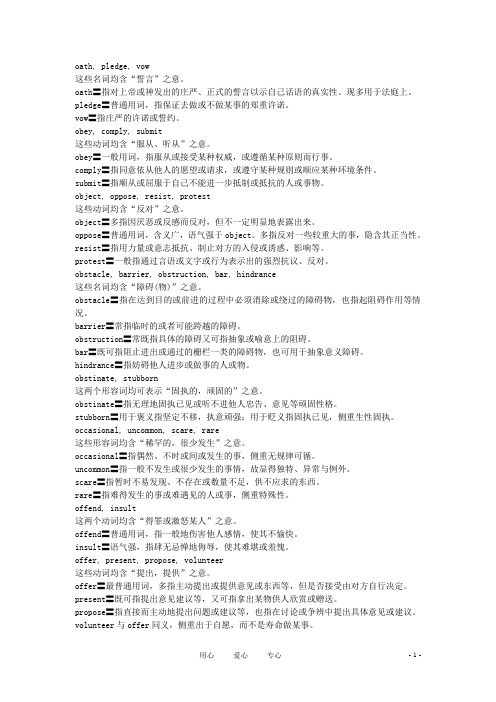
oath, pledge, vow这些名词均含“誓言”之意。
oath〓指对上帝或神发出的庄严、正式的誓言以示自己话语的真实性。
现多用于法庭上。
pledge〓普通用词,指保证去做或不做某事的郑重许诺。
vow〓指庄严的许诺或誓约。
obey, comply, submit这些动词均含“服从、听从”之意。
obey〓一般用词,指服从或接受某种权威,或遵循某种原则而行事。
comply〓指同意依从他人的愿望或请求,或遵守某种规则或顺应某种环境条件。
submit〓指顺从或屈服于自己不能进一步抵制或抵抗的人或事物。
object, oppose, resist, protest这些动词均含“反对”之意。
object〓多指因厌恶或反感而反对,但不一定明显地表露出来。
oppose〓普通用词,含义广,语气强于object。
多指反对一些较重大的事,隐含其正当性。
resist〓指用力量或意志抵抗、制止对方的入侵或诱惑、影响等。
protest〓一般指通过言语或文字或行为表示出的强烈抗议、反对。
obstacle, barrier, obstruction, bar, hindrance这些名词均含“障碍(物)”之意。
obstacle〓指在达到目的或前进的过程中必须消除或绕过的障碍物,也指起阻碍作用等情况。
barrier〓常指临时的或者可能跨越的障碍。
obstruction〓常既指具体的障碍又可指抽象或喻意上的阻碍。
bar〓既可指阻止进出或通过的栅栏一类的障碍物,也可用于抽象意义障碍。
hindrance〓指妨碍他人进步或做事的人或物。
obstinate, stubborn这两个形容词均可表示“固执的,顽固的”之意。
obstinate〓指无理地固执已见或听不进他人忠告、意见等顽固性格。
stubborn〓用于褒义指坚定不移,执意顽强;用于贬义指固执已见,侧重生性固执。
occasional, uncommon, scare, rare这些形容词均含“稀罕的,很少发生”之意。
初高中英语单词同义词辨析

初高中英语单词同义词辨析1. Large vs. Big- Large: 通常用于描述尺寸、数量或程度,强调超过一般标准。
- 例句: He has a large collection of stamps.- Big: 更口语化,可以用于描述各种事物,包括尺寸、重要性等。
- 例句: She dreams of becoming a big movie star.2. Quick vs. Fast- Quick: 强调动作或反应的迅速性。
- 例句: He gave a quick answer to the question.- Fast: 通常用于描述速度,但也可以用于描述动作的迅速性。
- 例句: The train is moving very fast.3. Scared vs. Afraid- Scared: 通常用于描述因某种具体事物或情况而感到恐惧。
- 例句: She is scared of snakes.- Afraid: 可以用于更广泛的恐惧感,包括担心或忧虑。
- 例句: I'm afraid I might fail the exam.4. Hope vs. Wish- Hope: 用于表达对未来的积极期望。
- 例句: I hope to see you again soon.- Wish: 可以用于表达对现在或过去的不切实际的愿望或遗憾。
- 例句: I wish I had studied harder for the test.5. Say vs. Tell- Say: 强调说话的内容。
- 例句: He said he would be late.- Tell: 通常用于描述向某人传达信息或命令。
- 例句: Please tell her to call me back.6. Little vs. Few- Little: 用于不可数名词,表示数量少。
- 例句: There is little water left in the bottle.- Few: 用于可数名词,表示数量少。
初中英语常用同义词辨析(88)

初中英语常用同义词辨析(88)sleep, doze, nap, slumber这些动词均含睡之意。
sleep : 普通用词,指一般的睡眠。
可用作引申指长眠或静止不动。
doze : 多用于口语中,指轻微的小睡或处于半睡状态。
nap : 指白天的小睡。
slumber : 多指人安详地或长时间地睡。
sleepy, asleep这两个形容词均含有欲睡的之意。
sleepy : 最常用词,指人昏昏欲睡,或沉睡时的寂静状态。
asleep : 作表语,多用于非正式的英语里,指处于睡着的状态,侧重动作的结果。
slip, glide, slide, skid这些动词均可表示滑动之意。
slip : 指不自觉地、偶然地滑动。
glide : 指自由、顺畅地流动,也指不费力、无声响地滑动。
slide : 通常多指与光滑表面保持接触并且迅速地连续滑动。
skid : 着重指不自主地或失去控制地滑动,特指车轮在结冰或潮湿路面上的滑动,常暗含有危险存在的意味。
socks, stocking这两个名词均表示袜之意。
socks : 指长不到膝的短统袜子。
stocking : 指长到膝或过膝的长袜,常用复数形式。
solve, resolve这两个动词均含解决之意。
solve : 普通用词,含义广,指为有一定难度的问题找到满意的解法或答复。
resolve : 主要指对问题或情况进行细微的分析或思索,以得出结论或解决途径。
soul, ghost, spirit这些名词均含灵魂,心灵之意。
soul : 指超越身体之外,永远存在的无形的东西,即所谓灵魂,亦可作人解。
ghost : 普通用词,主要指死者的灵魂。
spirit : 当指与body相对而言的所谓灵魂时,可与soul互换使用,但强调人的精神素质,也指神仙、精灵等。
space, universe, cosmos这些名词均含宇宙,太空之意。
space : 指大气层或太阳系之外的极高的天空,即太空之意。
初中英语常用同义词辨析(30)
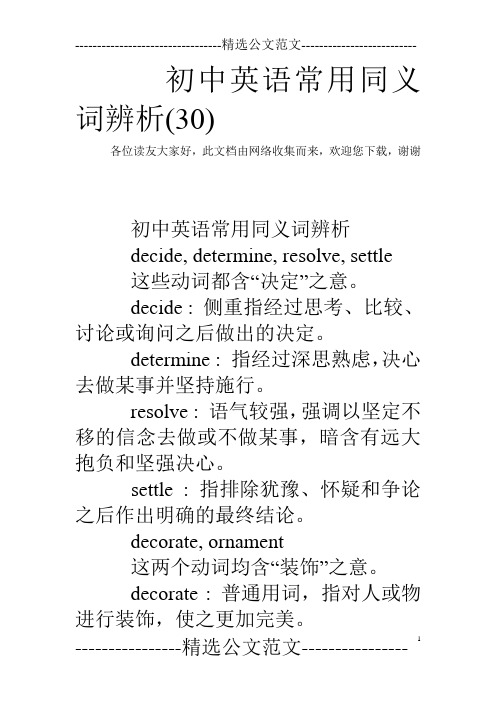
初中英语常用同义词辨析(30)各位读友大家好,此文档由网络收集而来,欢迎您下载,谢谢初中英语常用同义词辨析decide, determine, resolve, settle这些动词都含“决定”之意。
decide : 侧重指经过思考、比较、讨论或询问之后做出的决定。
determine : 指经过深思熟虑,决心去做某事并坚持施行。
resolve : 语气较强,强调以坚定不移的信念去做或不做某事,暗含有远大抱负和坚强决心。
settle : 指排除犹豫、怀疑和争论之后作出明确的最终结论。
decorate, ornament这两个动词均含“装饰”之意。
decorate : 普通用词,指对人或物进行装饰,使之更加完美。
ornament : 指装饰以精美之物,使某处或某物增添美丽的或景色。
decrease, diminish, lessen, reduce, dwindle这些协词的共同含义是“减少,变少”。
decrease : 指逐渐地、不断地减少。
diminish : 侧重大小数量和重要性的不断减小,强调减小的部分。
lessen : 普通用词,与decrease近义。
指数目、程度、价值、实力等的减少。
reduce : 普通用词,含义广。
指数量、程度的降低或减少。
dwindle与decrease同义,指逐渐减小,但强调变得越来越少终至全无。
dedicate, devote这两个动词均有“奉献”之意。
dedicate : 正式用词,指献身于某一崇高事业或目的,也可指把著作题献给他人。
devote : 普通用词,指决心把全部身心、精力、时间等献给某一目标,某一个人或致力于某一事业。
deep, profound这两个形容词都有表示“深的”之意。
deep : 普通用词,指由上到下,或由表及里的深度,可指具体或抽象事物。
profound : 语气较强,较为庄重,多指抽象的事物,多用于比喻。
defend, protect, safeguard, guard, shield, shelter, harbour这些动词均有“保护、保卫”之意。
初一英语同义词辨析62组

初一英语同义词解析1. chick, chicken二者均可指小鸡,chicken还可以当鸡肉 The chicken is delicious.2. travel,trip, journey,travel是最常用的,trip指短期的旅途,journey指稍长的旅途, a three-day trip3. sport, game sport多指户外的游戏或娱乐活动,如打球,游泳,打猎,赛马等;game指决定胜负的游戏,通常有一套规则 His favorite sport is swimming.4. a number of, the number ofa number of许多,谓语动词用复数。
the number of…的数目,谓语动词用单数。
The number of studentsis increasing.5. in front of, in the front ofin front of范围外的前面,in the front of范围内的前面 In the front of the room sits a boy.6. three of us, the three of usthree of us我们(不止三个)中的三个,the three of us我们三个(就三个人)The three of us---Tom, Jack and I went to the cinema.7. by bus, on the busby bus表手段,方式,不用冠词,on the bus表范围 They went there by bus.8. in a word, in wordsin a word总之,一句话, in words口头上 In a word, you are right.9. a girl可泛指所有女孩, one girl一个女孩 Can one girl carry such a big box?10. the doctor and teacher, the doctor and the teacherthe doctor and teacher指一个人,既是医生又是老师,the doctor and the teacher两个人,一个医生和一个老师 the doctor and teacher is11. family, house, homehome 家,包括住处和家人,house房子,住宅,family家庭成员. My family is a happy one. 12. sound, voice, noisesound自然界各种各样的声音,voice人的嗓音,noise噪音I hate the loud noise outside.13. photo, picture, drawingphoto用照相机拍摄的照片,picture可指相片,图片,电影片,drawing画的画Let's go and see a good picture..14. road, street, path, wayroad具体的公路,马路,street街道,path小路,小径,way道路,途径take this road; in the street, show me the way to the museum.15. class, lesson作"课"解时,两者可以替换.指课文用lesson. 指班级或全体学生用class. lesson 6; class 516. work, job二者均指工作。
初中英语同义词辨析
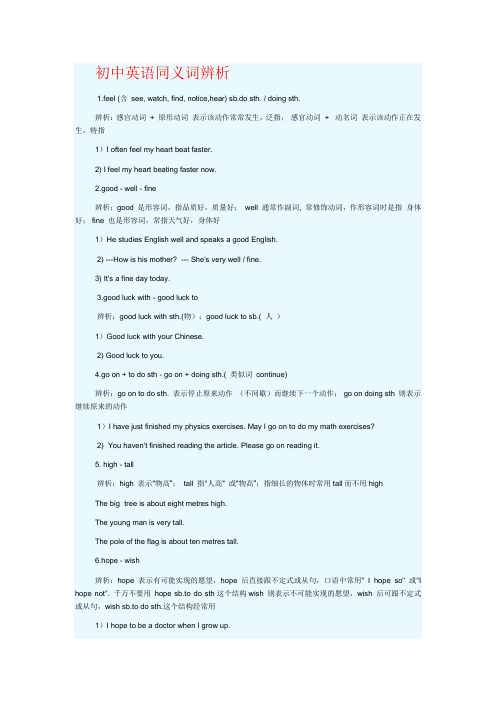
初中英语同义词辨析1.feel (含see, watch, find, notice,hear) sb.do sth. / doing sth.辨析:感官动词+ 原形动词表示该动作常常发生,泛指;感官动词+ 动名词表示该动作正在发生,特指1)I often feel my heart beat faster.2) I feel my heart beating faster now.2.good - well - fine辨析:good 是形容词,指品质好,质量好;well 通常作副词, 常修饰动词,作形容词时是指身体好; fine 也是形容词,常指天气好,身体好1)He studies English well and speaks a good English.2) ---How is his mother? --- She's very well / fine.3) It's a fine day today.3.good luck with - good luck to辨析:good luck with sth.(物);good luck to sb.( 人)1)Good luck with your Chinese.2) Good luck to you.4.go on + to do sth - go on + doing sth.( 类似词continue)辨析:go on to do sth. 表示停止原来动作(不间歇)而继续下一个动作; go on doing sth 则表示继续原来的动作1)I have just finished my physics exercises. May I go on to do my math exercises?2) You haven't finished reading the article. Please go on reading it.5. high - tall辨析:high 表示“物高”;tall 指"人高“ 或“物高”;指细长的物体时常用tall而不用highThe big tree is about eight metres high.The young man is very tall.The pole of the flag is about ten metres tall.6.hope - wish辨析:hope 表示有可能实现的愿望,hope 后直接跟不定式或从句,口语中常用" I hope so" 或"I hope not". 千万不要用hope sb.to do sth这个结构wish 则表示不可能实现的愿望,wish 后可跟不定式或从句,wish sb.to do sth.这个结构经常用1)I hope to be a doctor when I grow up.2) We hope that we all can pass the exam.3)-- Do you want to go with us? --- I hope so.4) He wishes he could fly to the moon some day.5) The teacher wished us to hand in our exercise-books in time.6.have to - must辨析:have to 表示客观需求,“必须”“一定”“不得不”,而must则表示主观愿望1)I had to stay at home to look after my mother because she is ill yesterday.2)He doesn't have to say so .3)You must learn English well.7. hanged - hung辨析:hanged 表示“绞死”“吊死”,hung 表示“悬挂”“吊起来”1)You will be hanged as a spy tommorrow.2) My wet clothes are hung on the line .8. have been - have gone辨析:have been表示“去过某地”,而have gone 则表示“到某地去了”,现不在这里1)I have been to Beijing twice already.2) My head teacher has gone to Nanjing.3) ---- Where is your father? --- He has gone to work.9. hear - listen - listen to辨析:hear 表示“听”的结果,listen to 表示“听”的动作,而listen 则是呼唤词,通常放到句首1)I listened to the teacher , but I heard nothing clearly.2) Please listen to her carefully.3) Listen! Who is crying?10.have/ have got(1)在英语口语中,常用have got 代替have ,作“有”解。
- 1、下载文档前请自行甄别文档内容的完整性,平台不提供额外的编辑、内容补充、找答案等附加服务。
- 2、"仅部分预览"的文档,不可在线预览部分如存在完整性等问题,可反馈申请退款(可完整预览的文档不适用该条件!)。
- 3、如文档侵犯您的权益,请联系客服反馈,我们会尽快为您处理(人工客服工作时间:9:00-18:30)。
初中英语同义词辨析英语学习过程中经常遇到同义、近义词的辨析,这是英语学习的难点之一,也是中考考点之一,现在把自己整理的一些初中常见的同义近义词的辨析放在这里,和朋友们交流,也供学生朋友选择学习。
1、talk tell speak sayspeak 和talk 通常用作不及物动词,都有“说话”之意。
在会议上发言用speak,名词为speech;随便漫谈用talk,其名词还是talk;tell表示“讲述”或“告诉”;say表示“说”;例如:can we speak about plans for the holidays?我们谈谈假期的打算好吗?the patient is too weak to speak.病人太衰弱了,不能说话。
my father was talking with my teacher when i got home yesterday。
昨天我到家时我父亲正在和我的老师谈话。
i always tell my daughter a story before she goes to sleep.女儿睡觉之前,我总讲故事给她听。
it‘s impossible to tell who will win the next election.下届选举谁能获胜无法预知。
she said nothing to me about it.关于这一点,她什么也没有对我讲。
*speak 当及物动词用时,宾语一般是语言或词语之类的词。
如: does anyone speak english here? 这儿有人会说英语吗?2、good well nicegood 形容词,好的,合适的,新鲜的,擅长的。
well 作形容词时,指"(身体)健康的”;还可用作副词,修饰动词。
nice形容词,美好的,令人愉快的,可爱的,特指取悦感官的事物。
she is good at english.她擅长英语。
this cake tastes good.这蛋糕好吃。
his mother is very well.他妈妈很健康。
she is a nice little girl.她是个可爱的小姑娘。
3、look see watch read 看look通常为不及物动词,强调“看”的动作,指“认真看”,强调看的对象时,后须接介词at才能带宾语,即look at。
see是及物动词侧重于看的结果“看见,看到”watch 作动词,意为“观看,注视”,多指观看运动着的事物,如电视、比赛、表演等。
read 主要强调“读,阅读,朗读”,汉语中常译成“看”,多指看书、报、杂志。
look!the man is coming!看!那个男的来了。
look at the map .看这张地图。
can you see the dog over there?你能看见那儿的狗吗?the children are watching the stars。
孩子们在看星星。
read a/ the book 看书一、maybe, probably , perhaps“可能,也许, 或许”, 表示说话人的猜测.maybe 一般用于句首或句末.perhaps 常用于句首或句中.probably 一般用于句中, 不用于句首.但, probably比perhaps 或maybe 表达的可能性大一些.eg: Maybe/ Perhaps I’m wrong .或许我错了. ( 也可能没错)I’m probably wrong .我很有可能错了.I’m perhaps wrong.我也许错了. ( 也可能没错)另外, 表示“可能, 也许”还可以用情态动词may 表达. eg: Maybe he is right. = He may be right. 他也许是对的.Perhaps they’ll go on a picnic this Sunday. = They may go on a picnic this Sunday.他们也许这个周日去野餐.二、few , a few , little , a little1. few , a few 修饰可数名词. little , a little 修饰不可数名词. Eg: There are a few mistakes in my composition.我的作文里有几处错误.There is little water in the glass.杯子里几乎没有水了.2. few 和little 的含义是否定的.表示“很少”或“几乎没有”.a few 和 a little 的含义是肯定的. 表示“少数几个”或“有一点儿”.eg: I’m new here, so I know few friends.我是新来的, 所以朋友很少.We’ve just borrowed a few books about Olympic Games .我们刚刚借了几本关于奥运会的书.There’s little time to think about it.没有时间考虑了.I only had a little porridge for lunch today.我中午只喝了一点儿粥.3. 当有only , quite 等词时, 只能用a few 和a little .We can see only a few trees there.我在那儿只能看见几棵树.There is only a little bread in the fridge.冰箱里只有一点儿面包了.注: quite a few = many 表示数量很多.Eg: I made quite a few friends when I was in Beijing .我在北京时, 交了许多朋友.三、each , every都是“每个”的意思, 后面接可数名词. 可以通用, 但二者又有不同.1. each 强调个体, every着重强调整体.Eg: Each student has got a new dictionary.每个学生各有一本新词典.Every student has got a new dictionary.每个学生都有一本新词典.( 在这里every student 相当于all the students)2. each 用于指两个或两个以上的人或物. every 用于指三个或三个以上的人或物.There some trees on each side of the street. 街道的每一侧都有一些树. ( each side = both sides, each 在本句中不能用every 代替)You look more beautiful each/ every time I see you.我每次看到你, 你都看起来更漂亮.3. each 还可以作代词, each of +复数名词或代词, 谓语动词仍用单数. 但every 不能这样用. every 是形容词.Each of the students has got a new book.=Every one of the students has got a new book.每个学生各有一本新书.Each of them likes light music .= Every one of them likes light music.他们每个人都喜欢轻音乐.注: 以上两句还可以这样表达:The students each have got a new book . 或The students have got a new book each .They each like light music. 或They like light music each.四、when , while 和as1. when 可以表示一段时间, 从句中的谓语动词用延续性的动词, 此时可用while 替换.When/ While they were swimming in the river , it suddenly began to rain .当他们在河里游泳时, 天突然下雨了.When 还可以指一个时间很短的动作发生时, 另一个动作或情况也在发生或存在. 从句中的谓语动词用非延续性的动词. 这时, 不能用while 替换. 但可以用as .Mother was watering the garden when / as came home yesterday.昨天, 我回家时, 妈妈在花园浇花儿.2. while 表示一段时间或一段过程. 相当于during the time 强调主从句的动作同时发生. 从句的谓语动词必须是延续性的动词. 这时可以用when 或as 替换.While we were talking happily Lily hurried in .正当我们高兴地交谈时, 莉莉匆匆忙忙地进来了.注: while 还可以表示两个同类的动作进行对比. 意思是“而”. Mr. King likes country life while Mrs. King likes city life.金先生喜欢乡村生活, 而金夫人喜欢城市生活.3. as 强调主从句的动作同时发生, 尤其指短时间的动作同时发生. As I getting on the bus , I heard some one calling my name.正当我要上车时, 听见有人在叫我的名字.五、between, amongbetween 和among 都是介词, between 通常用于两者, 意思是“在……两者之间”, among 则用于三者或三者以上, 意思是“在……当中”. 但是表达三者或三者以上的人或事物中两两之间的关系时, 用between.Eg: I always sit between Mum and Dad when we take photos.拍照时, 我总是坐在爸爸和妈妈中间.They found a pear among the apples.他们在那些苹果中发现了一个梨.There’re ma ny flowers between the trees .这些树之间有许多花. ( 每两棵树之间都有花. )六、among , in the middle ofamong的意思是“在……当中”, 并不是表示在正中间, 有时有one of…的意思. 而in the middle of 的意思是“在……的中间”, 不偏不倚.Eg: The teacher is sitting among his students.老师正坐在他的学生之间. (不一定坐在中间, 但是与学生们在一起) Shanghai is among the largest cities in the world .上海在世界上最大城市之列. ( among = one of )Tom is sitting in the middle of the bus .汤姆坐在汽车中间.七、Such , so1. such 是形容词, 与其它形容词一起作单数名词的定语时, 用法为: such +a /an +形容词+单数名词, 而so 是副词, 修饰形容词或副词, 用法为: so +形容词+a / an +单数名词eg: It’s such an important match that I can’t miss it.It’s so important a match that I can’t miss it.这场比赛如此重要, 我不能错过.2. such 与其它形容词一起作复数名词或不可数名词的定语时, 用法为: such+形容词+复数名词/不可数名词, 但是如果形容词是few , little , many , much 时, 则要用so . 即, so few/ many+复数名词. Solittle / much +不可数名词.Eg: Can you believe that in such rich countries there should be so many poor people ?你相信在如此富裕的国家有这么多贫穷的人吗?So much of water is wasted in the world every day.世界上每天有这么多水被浪费掉.八、Nobody , no one , none1. nobody 和no one 都指人, 意思“没有人”, 作主语时, 谓语动词用单数形式. 而且后面不能跟of 短语, 常用来回答who 和不确定的问题.Eg: Luckily, nobody/ no one was hurt in that accident .幸运的是, 在那次事故中没有人受伤.Who went to the net bar this week ? Nobody/ No one.这周谁去网吧了? 没有人去.2. none既可以指人, 也可以指物, 意思“没有人, 没有东西”等, 后面可以跟of 短语, 作主语时, 如果指代的是可是名词, 谓语动词用单数,复数都可以. 如果它指代的是不可数名词, 谓语动词用单数形式. 常用来回答how many / how much 以及有特定范围的问题.Eg: How many of the women are nurses ? None (of them is / are.)这些女士中有多少是护士? 一个也没有Which of the boys plays football well ? None of them does.这些男孩中哪一个足球踢的好? 一个也没有How much oil is left in the bottle ? None ( of it is left).瓶子里还剩多少油? 一点儿也没剩.九、idea, concept, conception, thought, notion, impression这些名词均有“思想、观点、观念”之意。
